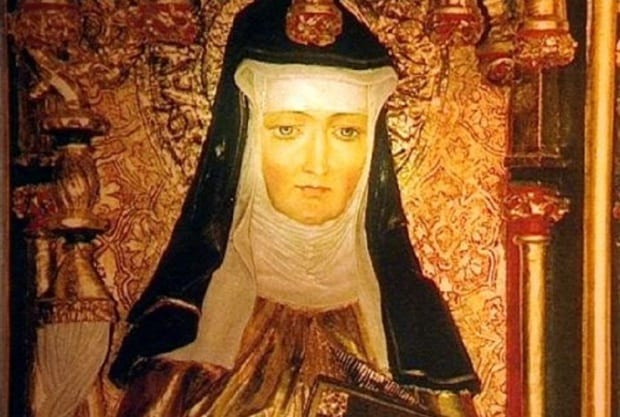
Pope Francis has agreed to set up a commission to study the existence of deaconesses in the early Church, and to consider the possibility of restoring such offices today [news sources: one / two / three / four].
I’ve already been asked twice this morning in private messages, what I think of this. My initial “raw” / off-the-cuff responses in return Facebook PMs and in one private group, were the following:
I don’t think it’s absolutely inconceivable, as there appear to be deaconesses in the Bible. But it would raise a huge stink.
There are women Doctors of the Church, and tremendous mystics and saints. I don’t see how possibly preaching a homily is essentially different from the written treasures of those like St. Teresa of Avila, St. Catherine of Siena, St. Therese (three of my very favorite saints), etc. My opinion isn’t fully formed, but I’m just saying it’s not inconceivable.
According to the old Catholic Encyclopedia [“Deaconesses”] (no bastion of theological liberalism), deaconesses are possibly arguable from the New Testament, and definitely existed in the early apostolic and patristic Church.
Pope St. John Paul II made it quite definitive that women could never be priests. [his 1994 apostolic letter Ordinatio Sacerdotalis]
The so-called “progressives” would, of course, seek to exploit it, as they do everything else for their nefarious ends (as we massively see regarding Amoris Laetitia), but that’s a whole ‘nother discussion.
Liberals always try to exploit everything. They do that with supposedly finding permissible sodomy in the Bible, with Vatican II, with Amoris Laetitia [as well as women priests]. This will always be the case. I don’t see why that should stop us from believing or putting into practice something we deem to be proper and helpful (if indeed this is determined to be a good thing): just because they will then try to distort what happened and use it for their empty-headed goals.
Of course it is a “stalking horse,” for liberals. I’m saying that their predictable seeking to co-opt something for modernist / heterodox ends is not in and of itself a reason to rule anything out, since every good thing is distorted, inside the Church and outside it.
Now to briefly examine the overall question (this is only a preliminary treatment):
The Catholic Encyclopedia states, regarding the biblical data:
We cannot be sure that any formal recognition of deaconesses as an institution of consecrated women aiding the clergy is to be found in the New Testament. There is indeed the mention of Phebe (Romans 16:1), who is called diakonos, but this may simply mean, as the Vulgate renders it, that she was “in the ministry [i.e. service] of the Church”, without implying any official status. Again, it is not improbable that the “widows” who are spoken of at large in 1 Timothy 5:3-10, may really have been deaconesses, but here again we have nothing conclusive. . . . In any case there can be no question that before the middle of the fourth century women were permitted to exercise certain definite functions in the Church and were known by the special name of diakonoi or diakonissai.
Evidence from the early Church is relatively more conclusive:
With regard to the duration of the order of deaconesses we note that when adult baptism became uncommon, this institution, which seems primarily to have been devised for the needs of women catechumens, gradually waned and in the end died out altogether. In the time of Justinian (d. 565) the deaconesses still held a position of importance. At the church of St. Sophia in Constantinople the staff consisted of sixty priests, one hundred deacons, forty deaconesses, and ninety subdeacons; . . .
In the West in spite of the hostile decrees of several councils of Gaul in the fifth and sixth centuries, we still find mention of deaconesses considerably after that date, though it is difficult to say whether the title was more than an honorific name attributed to consecrated virgins and widows. Thus we read in Fortunatus that St. Radegund was “ordained deaconess” by St. Medard (about A.D. 540 —Migne, P.L., LXXXVIII, 502) So also the ninth Ordo Romanus mentions, as forming part of the papal procession, the “feminae diaconissae et presbyterissae quae eodem die benedicantur” and diaconissae are mentioned in the procession of Leo III in the ninth century (Duchesne, Lib. Pont., II, 6) Further the Anglo-Saxon Leofric missal in the eleventh century still retained a prayer ad diaconissam faciendam which appears in the form Exaudi Domine, common to both deacons and deaconesses.
There can be no doubt that in their first institution the deaconesses were intended to discharge those same charitable offices, connected with the temporal well being of their poorer fellow Christians, which were performed for the men by the deacons. But in one particular, viz., the instruction and baptism of catechumens, their duties involved service of a more spiritual kind. The universal prevalence of baptism by immersion and the anointing of the whole body which preceded it, rendered it a matter of propriety that in this ceremony the functions of the deacons should be discharged by women. The Didascalia Apostolorum (III, 12; see Funk, Didascalia, etc., I, 208) explicitly direct that the deaconesses are to perform this function. It is probable that this was the starting point for the intervention of women in many other ritual observances even in the sanctuary. The Apostolic Constitutions expressly attribute to them the duty of guarding the doors and maintaining order amongst those of their own sex in the church, and they also (II, c. 26) assign to them the office of acting as intermediaries between the clergy and the women of the congregation; . . .
As to Pope Francis’ opinion, according to Cindy Wooden, in her Catholic News Service report:
Asked about deaconesses in the New Testament and the possibility of the modern church admitting women to the permanent diaconate, Pope Francis had said his understanding was that the women described as deaconesses in the Bible were not ordained like permanent deacons are. Mainly, he said, it appeared that they assisted with the baptism by immersion of other women and with the anointing of women.
However, he said, “I will ask the (Congregation for the) Doctrine of the Faith to tell me if there are studies on this.”
Pope Francis also promised to have the Congregation for Divine Worship and the Sacraments send the UISG a full explanation of why women cannot give a homily at Mass. While women can preach at a Liturgy of the Word when there is not a celebration of the Eucharist, he said, at Mass the Liturgy of the Word and the Liturgy of the Eucharist are parts of a whole and only one who is ordained can preside and preach.
[see the complete transcript of his remarks, in order to interpret them in their full context]
See also more about the biblical Phoebe (non-Catholic articles, so Protestant bias may possibly be present) [Wikipedia / International Standard Bible Encyclopedia / All the Women of the Bible / Society of Biblical Literature article / Anglican reflections]
For an excellent in-depth Catholic treatment of the history of deaconesses, see “Deaconesses? Sure. ‘Women Deacons’? Not So Fast. History and theology attest to the difference,” by Jim Russell (Catholic Answers Magazine). See also his article, “What Should I Know About Pope Francis and ‘Women Deacons’?” (Catholic Answers blog, 5-12-16)
Catholic David L. Alexander provides another lengthy overview of the question of deaconesses, with lots of history, in an article originally published in the Arlington Catholic Herald in 1996.
Catholic Gregory DiPippo offers several worthwhile thoughts in the discussion of this paper on my Facebook page.
For Orthodox treatments of the topic, see:
The Liturgical Functions of Consecrated Women in the Byzantine Church (Valerie A. Karras)
Rejuvenation of the Ministry of the Ordained Deaconess (Saint Catherine’s Vision)
*****
Related Reading
Is Catholic Male-Only Priesthood Inherently Sexist? [2007; slight revision: 4-5-16]
Dialogue: Sexist, Misogynist Bible and Christianity? (Debate with Five Atheists. Are Christian Women Abused as “Sheep”?) [9-20-10; abridged a bit on 2-12-20]
Do Altar Girls Alter Intentions of Would-Be Altar Boys? [5-19-14]
Altar Girls: Consideration of Pro & Con Arguments [May 2014]
Dialogue with a Traditionalist (REactionary) Regarding Deaconesses (vs. Dr. Peter Kwasniewski) [5-13-16]
On Feminine Metaphors, Pronouns, & Attributes of God [9-22-17]
Dialogue on Altar Girls and Altar Boys [3-16-18]
Dialogue: Are Jesus, the Bible, & the Church “Sexist”? [11-4-19]
***
(originally posted on 5-12-16)
Photo credit: St. Hildegard von Bingen (1098-1179), Doctor of the Church [public domain / Wikimedia Commons]
***












